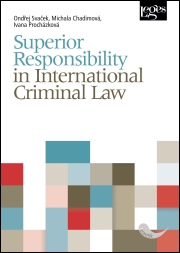Superior Responsibility in International Criminal Law

The book analyzes traditional form of responsibility applicable in proceedings before the international criminal courts and tribunals according to which commander/superior is held responsible for failure to prevent or repress crimes under international law committed by his/her subordinates.
In chronological order, the book addresses controversial origins of this doctrine and relevant case-law adopted until recently before the ad hoc tribunals, the International Criminal Court and some hybrid tribunals (mostly the ECCC). The book focuses both on material and procedural aspects of the doctrine. The procedural aspects are analyzed in relation to legal framework applicable before the ICC. The book elaborates on closely watched Regulation 55 which permits change in legal characterization of facts to accord with crimes in the subject-matter jurisdiction of the Court, or with the form of responsibility envisaged in the Statute. The book explores the consistency of this rule with statutory provisions concerning prosecutorial independence and the accused person's right to fair trial and contributes to better understanding between different forms of responsibility (Article 25 and Article 28 of the ICC Statute) and different subcategories of the superior responsibility itself.
Finally, the book addresses various standards of proof envisaged in the text of the Rome Statute. The aim of the last chapter is to find out, what exactly is covered by these standards in relation to the doctrine of superior responsibility and what exactly the Prosecutor has to establish in various stages of the proceedings before the ICC.
The book is proposed to serve both to scholars and practitioners in area of international (criminal) law.
Anotace:Kniha analyzuje tradiční formu odpovědnosti aplikovanou v řízeních před mezinárodními trestními soudy a tribunály, podle níž je velitel či nadřízený odpovědný za to, že nezabránil nebo nepotlačil spáchání zločinů podle mezinárodního práva svými podřízenými.
Kniha popisuje kontroverzní vývoj této doktríny a související aktuální judikaturu tribunálů ad hoc, Mezinárodního trestního soudu a některých hybridních tribunálů (zejména Zvláštních senátů soudu pro Kambodžu). Soustředí se na hmotněprávní i procesní aspekty této doktríny. Procesní aspekty jsou analyzovány ve vztahu k právní úpravě používané před Mezinárodním trestním soudem. Kniha se podrobně zabývá Nařízením 55, které dovoluje změnu v právní kvalifikaci skutečností ve shodě se zločiny, které jsou podstatou jurisdikce soudu, nebo ve shodě s formou odpovědnosti stanovenou Římským statutem.
Kniha zkoumá soulad tohoto pravidla se zákonnými ustanoveními, jak je nezávilost žalobce a právo obžalovaného na spravedlivý proces, a přispívá k lepšímu pochopení různých forem odpovědnosti (čl. 25 a 28 Římského statutu) a různých kategorií samotné odpovědnosti nadřízeného.
Závěrem kniha popisuje různé důkazní standardy zakotvené ve znění Římského statute. Cílem poslední kapitoly je zjistit, co je konkrétně myšleno těmito standardy ve vztahu k doktríně odpovědnosti nadřízeného a co přesně musí žalobce prokázat v různých stadiích řízení před Mezinárodním trestním soudem.
Publikace je určena studentům i odborníkům z aplikační praxe v oblasti mezinárodního (trestního) práva.
zašlete na e-mail
olomouc(zavináč)knihyleges.cz
zašlete na e-mail
praha(zavináč)knihyleges.cz